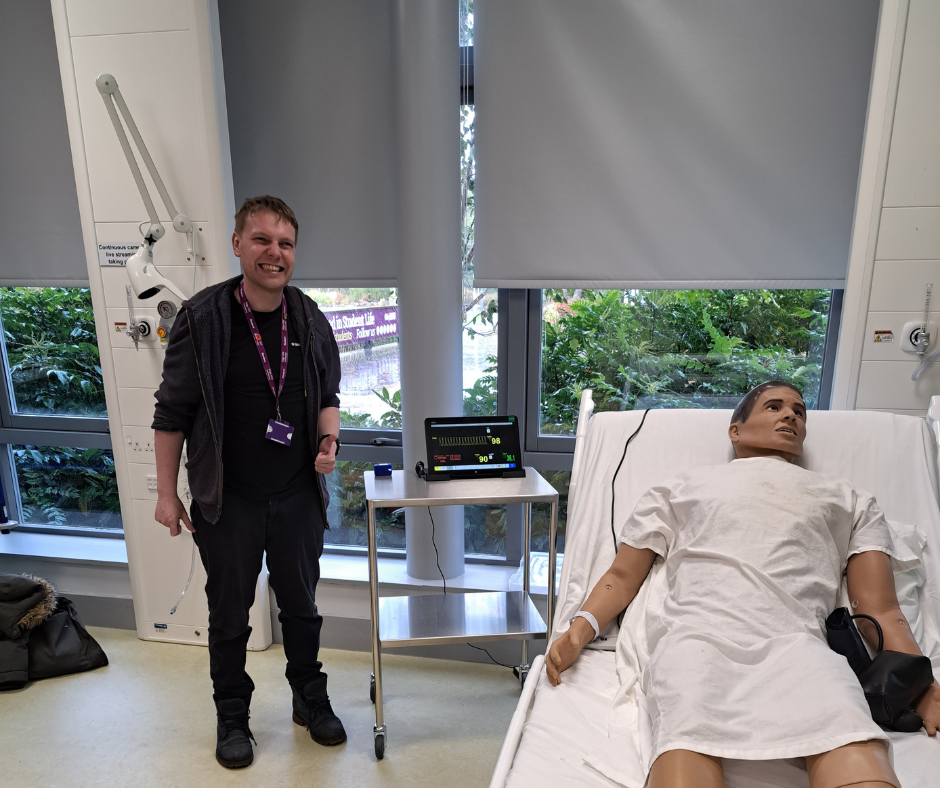We’re delighted to be relaunching our Trainee Nursing Associate programme for the second year running, in partnership with Edge Hill University and the University of Salford.
Our Level 5 Nursing Associate programme is a two-year foundation degree course that provides a great pathway into a career in health and social care. The course is comprised of both academic work at university, and placements in one of our independent mental health hospitals in the North West – allowing trainees to gain a combination of practical experience and theoretical knowledge.
The role contributes to the core work of nursing delivering hands-on, person-centred care, freeing up registered nurses to focus on more complex clinical care.
On completion of the Nursing Associate programme, our trainees will have a foundation degree and will become Registered Nursing Associates with the Nursing and Midwifery Council. They will also be equipped with the knowledge, understanding, skills, attitudes and behaviours to work in clinical healthcare settings. Qualified Nursing Associates may go on to train as a registered nurse by putting their training towards a shortened nursing degree or registered nurse degree apprenticeship (RNDA).
We caught up with Nick and Jade, two of our current Trainee Nursing Associates, to find out more about their experience on the programme so far.
Nick Wheeler – Edge Hill University
Nick, 34, has been a Support Worker with us for over 4 years, and is now completing the TNA course with Edge Hill University.

What have you learnt on the TNA course so far?
We have been doing lots of work in the simulation suite, performing assessments related to vital signs and looking at how to escalate concerns in the correct way. This has enabled me to analyse everything that needs to be done in an emergency situation, helping me to respond better when facing these situations in the future.
I have been doing my first placement block at one of AFG’s Independent Hospitals in Cheshire where I currently work.
I have been shadowing the nursing staff, taking part in activities such as medication administration, physical health monitoring, and completing various assessments with people we support which form part of their recovery.
I am delighted to have passed the assessments that we completed in the first term and have received some constructive feedback.
What has been your favourite topic on the Trainee Nursing Associate programme so far?
Cardiology was my favourite topic, as I had never studied this before. I was able to learn from my peers and engage in some research which I found really interesting.
Has anything surprised you about the Trainee Nursing Associate programme?
I have been surprised at the volume and depth of content that is covered within the course. We cover a range of topics across healthcare, from general nursing to learning disability and mental health.
Would you recommend the Trainee Nursing Associate programme?
I would recommend it to those who are unsure on which area of healthcare they want to go into, as it enables you to try different things without specialising. It’s a good way to keep your options open before going on to specialise in the area that you like the most. It’s also a good way to advance in your career without completing a 3-year undergraduate degree.
What is your proudest achievement on the course so far?
I take pride in the fact that I am now able to contribute more (in a different way) to the care of the people we support and have a deeper involvement in that care.
What has been the most challenging part of the Trainee Nursing Associate course?
Juggling my role as a support worker and my role as a student at Edge Hill University has been a challenge at times, but it has been great to be part of the team at our mental health hospital in Cheshire.
Jade Higson – University of Salford
Jade, 33, has been with AFG since 2010, working in supported living for adults with learning disabilities. Jade started the TNA course in September 2023 with the University of Salford.

How did you get involved in the TNA course?
I always wanted to do nursing but with a family at home, it was a difficult task.
When AFG introduced they would be supporting the TNA course, I jumped at the chance.
I moved over to AFG’s mental health division which I really am enjoying. Whilst working at one of AFG’s Independent Hospitals in Greater Manchester, I also attend university once a week and have learnt so much on the course already.
What has been your favourite topic so far?
My favourite topic that I have learnt so far is around mental health. I have found this very interesting and there was a lot to learn that I didn’t know. As it is relevant to my current role, I found it very informative. I enjoyed learning about different mental health conditions and the effects that these conditions can have on people, and learning how best to support people. I applied these practices in my current role, and it definitely helped me.
Has anything surprised you about the Trainee Nursing Associate programme?
What surprised me most is the amount of support the University of Salford offer. Whether this is about the program, academic work, or personal issues – there is a lot of available support should you need it. Also, the opportunities I have had working one of AFG’s mental health hospitals has been amazing. I’ve been able to attend meetings with people we support, take part in assessments at different hospitals, and experience external placements.
What would you say to somebody who was thinking about applying to the Trainee Nursing Associate programme?
I would say if you are thinking about applying then go for it. It is such an amazing opportunity to further your career and learn new skills. I would absolutely recommend the program to other support workers – I have encouraged a few colleagues to apply for the programme already!
What have you found most challenging about the programme?
The thing I’ve found most challenging about the program was learning how to write the essays to a university standard and learning how to research and reference correctly. However, the university provided a lot of support around this.
What has been your proudest achievement on the course so far?
My proudest achievement so far was passing my first assignment with a good grade, and completing my first essay.
Interested in a career in health and social care? Explore our current vacancies here.